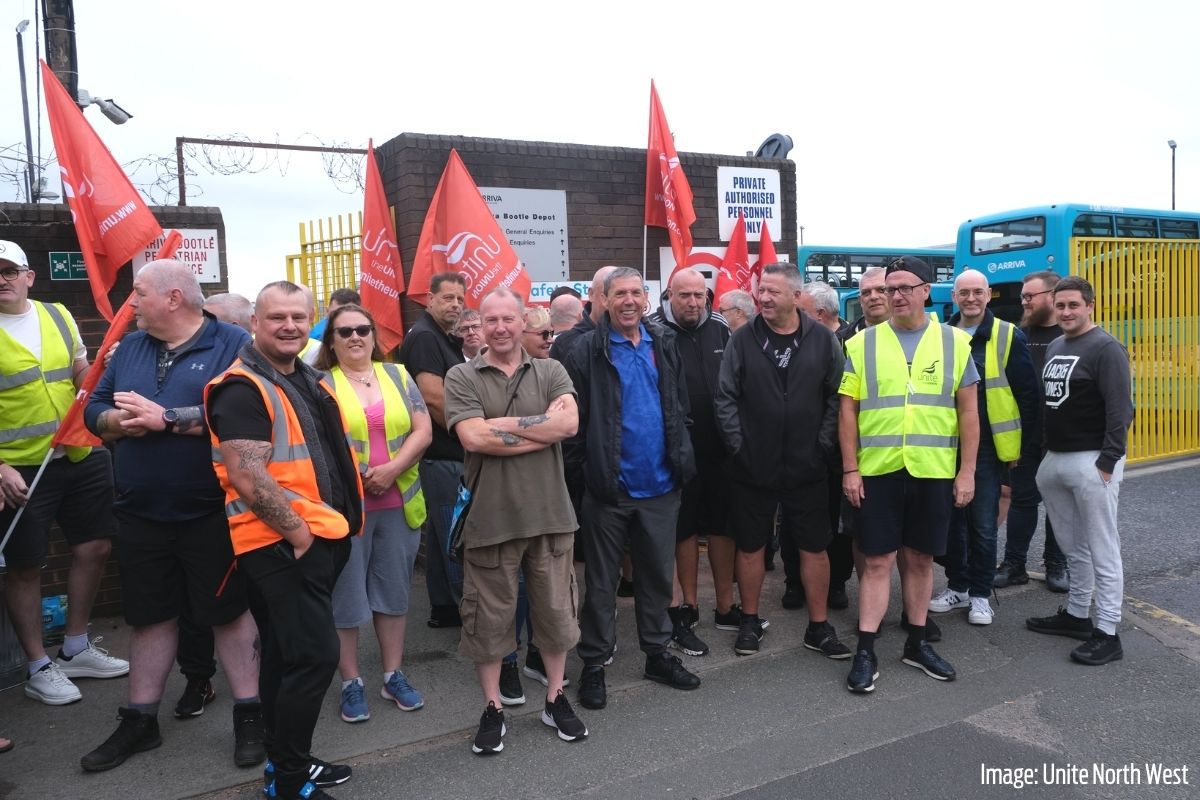Arriva bus drivers in the North West are undertaking indefinite strike action. Across the country, transport workers are fighting back against attacks on pay, jobs, and conditions. These struggles must be united behind demands for nationalisation.
Yesterday, on 20 July, bus drivers at Arriva in the North West began an all-out strike in response to an unacceptable below-inflation pay offer.
The drivers have rejected what the company is spinning as a pay rise of 8.5%. In reality, this figure is split, with 5% only from April, and then 3.5% from October. Even if it was actually at 8.5%, however, this would still be below inflation.
As one driver told us: “With the way the economy is, we can’t afford not to strike.”
As a result, almost 2,000 drivers – organised in Unite and GMB – have walked out across Merseyside, Greater Manchester, Lancashire, and Cheshire, causing major disruption to many services.
Excuses

Socialist Appeal supporters in Merseyside went down to picket lines at Bootle and Old Swan depots to show solidarity and speak to the drivers.
On the picket lines, morale was high, with a BBQ flaming and music blaring. Support from the public was high, with many cars beeping their horns in solidarity as they drove past.
According to the drivers, Arriva bosses have justified their poor offer by asserting that the “pot is empty, and that we could take or leave the pay offer they presented us”.
The bosses say this is down to the fact passenger numbers have not returned to pre-pandemic levels.
But as GMB regional organiser Robbie Marnell confirmed when speaking to us, this is nonsense: buses are full; and in some cases, they have to drive past stops as they’re unable to take any more passengers.
This is the same excuse being used by rail bosses in the RMT’s dispute over job cuts and pay. Across the board, employers are using pandemic-related excuses to launch an assault on workers’ wages and conditions.
Drivers at Stagecoach in Merseyside were also set to come out. But this strike was called off after a renewed offer – of an above-inflation pay rise – was accepted.
Part of this deal also includes a guarantee that wages will rise in line with the RPI level of inflation or by 2% (whichever is greater), from March next year.
Many of the drivers were buoyed by this. “It’s inspiring,” one driver told us. “Stagecoach workers came out with that fantastic result. It makes you think that you can come out with something just as good, if not better.”
Day 2 of strike action for our @arrivanorthwest members.
Over 1,800 bus drivers have walked out over the company’s pitiful pay offer of just 3% (without strings) or 6% if they give up their sick pay.
With real inflation (CPI) running at 11.7%, 3% and 6% are real terms pay cuts! pic.twitter.com/rXQLaAjKMn
— Unite North West (@Unite_NorthWest) July 21, 2022
Coordination

There have been a number of other strikes by bus drivers in recent months. As Marnell told us: “People have just had enough, not just at Arriva, but all around the UK.”
Strikes have recently hit services across west, south, and even parts of north and east Yorkshire, in a pay dispute involving Arriva drivers and engineers. These have been on and off, with a new offer currently being considered.
In March, drivers in Croydon, London, also went out on strike for 48 hours, again over pay. And a London-wide bus strike could even hit the capital, should TfL fail to reach a deal with Unite over potential cuts.
Last year in Manchester, meanwhile, bus drivers organised in Unite beat back the bosses’ ‘fire and rehire’ attempts through sustained strike action.
Across the country, bus workers are clearly facing attacks on jobs, wages, and conditions, in what is already a stressful and low-paid job. At the same time, passengers face higher ticket prices and unreliable services.
Such attacks are often by the same companies, with Arriva and Stagecoach holding a monopoly over bus transport in Britain.
Rather than fight separately, action should be taken across regions simultaneously, in order to win an agreement for drivers up-and-down the country as a whole. This could effectively shut bus services in every city, town, and village.
If this was combined with coordinated action alongside unions such as the RMT, these workers could bring Britain’s roads and railways to a halt – and, in doing so, win big.
Picket line this morning at the Arriva bus depot in Birkenhead. Great to see such a turnout & public support throughout the day.Bringing solidarity & doughnuts from Merseyside FBU.Get out and support workers fighting for a better deal @unitetheunion @leejhunter @fbumerseyside pic.twitter.com/WbeanrG0TN
— Ian Hibbert (@hibbert_ian) July 20, 2022
Nationalisation

United, militant action such as this would then put workers in the position to demand real change – not just regionally, but across the country.
This should include important political demands, such as reversing the privatisation of bus services, the railways, and all transport, which has only led to ever-worsening services and working conditions.
This is what the labour movement must fight for. Only a fully-nationalised, integrated public transport system – run by workers themselves – can permanently guarantee decent wages and conditions.






